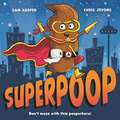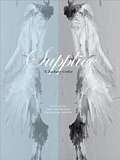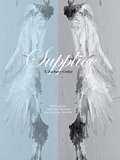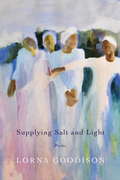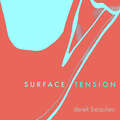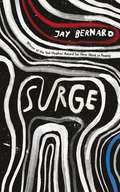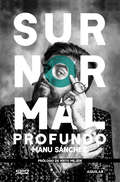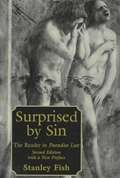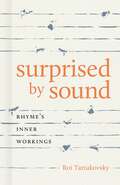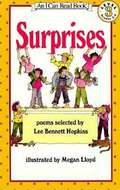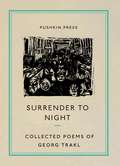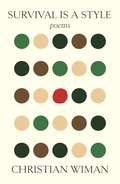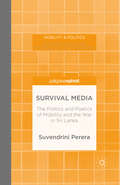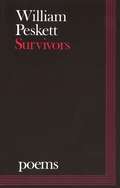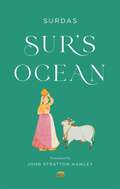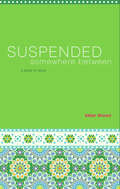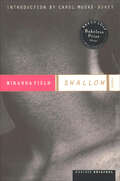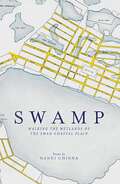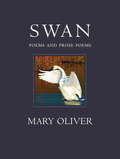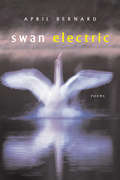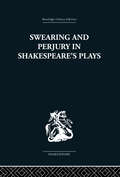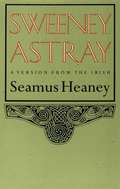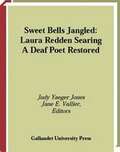- Table View
- List View
Superpoop
by Sam HarperThe toot-ally hilarious and messy origin story of Superpoop, your new favourite pooperhero, perfect for children (and parents) who enjoy a little potty-humour!Superpoop is fresh from hero training and only needs one mission under his belt to join the super league of superheroes. Yet, whenever he tries to save the day, another hero always gets there first! All Superpoop needs is a job that only he can do, so when toilet trouble is the mission of the day, he might just get the plopportunity!
Supplice
by T. Zachary CotlerWinner of the 2014 Colorado Prize for Poetry. Supplice is the second installment in T. Zachary Cotler's sonnet sequence that began with Sonnets to the Humans. "Supplice," the systematic infliction of physical and/or mental torture, is both the subject and the main character of this sequence. These are amatory sonnets, but with love and rhyme tortured into broken and boneset textures. Supplice herself, the dark lady of these sonnets, is difficult to pin down with an epithet. Is she the angel of reality, banality, popular culture, pornography, uncertainty, or economic and environmental crisis? She has something to do with the history of cruelty and pain, with the devaluation of traditional ideas of beauty, and with the silence and science that have replaced divinity. A moving love triangle is to be found in these pages, the vertices of which appear to be Supplice, the reader/writer, and one's unobtainable ideal.Supplice is Cotler's third book of poems. In keeping with his previous books, this is a high-velocity lyricism of angular, elegiac, multi-dimensional pieces, seamlessly joined.
Supplice (Colorado Prize for Poetry)
by T. Zachary CotlerPublished by the Center for Literary Publishing at Colorado State University Winner of the 2014 Colorado Prize for Poetry, Supplice is the second installment in T. Zachary Cotler’s sonnet sequence that began with Sonnets to the Humans.These are amatory sonnets, but with love and rhyme tortured into broken and boneset textures. Supplice herself, the dark lady of these poems, is difficult to pin down with an epithet. Is she the angel of reality, banality, popular culture, pornography, uncertainty, or economic and environmental crisis? She has something to do with the history of cruelty and pain, with the devaluation of traditional ideas of beauty, and with the silence and science that have replaced divinity.
Supplying Salt and Light
by Lorna GoodisonThis stunning new book of poems from internationally renowned poet Lorna Goodison opens in Spain and Portugal, conjuring up a new history of the Caribbean and a new way of setting up its heritage. The title sets the tone for poems about backgrounds and outlines and shadows and sources of light. This extraordinary book -- "a wide lotus on the dark waters of song" -- is filled with surprises at every turn, as a Moorish mosque becomes a cathedral in Seville, a country girl dresses in Sunday clothes to visit a Jamaican bookmobile, and a bear appears suddenly, only to slip away silently into the trees on a road in British Columbia. The heartache of Billy Holliday singing the blues, the burden of Charlie Chaplin tramping the banana walks of Jamaica's Golden Cloud, and the paintings of El Greco, the quintessential stranger, come together on the poet's pilgrimage to Heartease, guided by a limping angel and inspired by the passage-making of Dante; the book ends with a superb version of the first of his cantos, translated into the poet's Jamaican language and landscape with the gift of love.From the Trade Paperback edition.
Surface Tension
by Derek BeaulieuTypography meets poetry at a Pink Floyd laser-light show In Surface Tension, poetry is liquefied. Flowing away from meaning, letters and words gather and pool into puddles of poetry; street signs and logos reflected in the oily sheen of polluted gutters of rainwater. Like a funhouse mirror reflecting the language that surrounds us, the pages drip over the margins, suggesting that Madge was right, we are “soaking in it!” Surface Tension updates visual poetry for our post-pandemic age, asking us rethink the verbiage around us, to imagine letters as images instead of text, to find meaning in their beautiful shapes as Beaulieu stretches, torques, slides, blurs, and melts them into Dali-esque collages. "Not words, letters; not letters, shapes; not shapes, figures; not figures, ciphers; not ciphers, ornaments; not ornaments, decoration; not decoration, semiotics; not semiotics, communicative possibilities; not vagrant potential, slowly forming inflection; not melting deflection, language as dance: in, out, upside down, flapping, flipping, all ways round." – Charles Bernstein, recipient 2019 Bollingen Prize for American Poetry "The striking compositions you’ll find in Surface Tension are being presented sequentially in book form, yet that they wouldn’t be out of place hanging on the wall goes without saying. Beaulieu swerves Gomringer when writing that 'Readibility is the key: like a logo, a poem should be instantly recognizable...' yet, to this reader, these works merit sustained and enthusiastic viewing precisely because they teeter on the edge of legibility. The kinetic, glitchy quality of their 'alphabetic strangeness' keeps them unrecognizable as poems and, here, 'that is poetry as I need it,' to quote Cage. Think of them as anti-advertisings selling you nothing but bountiful manifestations of the irreducible plasticity of numbers, punctuation marks, and letter forms. No logos." – Mónica de la Torre, Madelon Leventhal Rand Endowed Chair in Literature, Brooklyn College; co-editor of Women in Concrete Poetry 1959–1979 "With his distinctive visual palindromes and angled axes of symmetry, Derek Beaulieu has developed a signature mastery of Letraset, leveraging the twentieth-century technology as a vehicle for bring concrete poetry into the twenty-first century. With Surface Tension, Beaulieu takes the possibilities of that new idiom even further, unsettling the fixity his symmetries once reinforced and dislodging the set in Letraset as poems distort in fun-house-mirror swerves, sag as if under their own weight, pool and smear in the liquid logic of heated ink, or swoop and blur as if in motion. In the process, these poems make visible the filmic potential of the photocopier, the facture of abraded transfers from brittling stock, and the three-dimensional substrate of the page with its flexible bends in curving space. These are thus poems in part about their own modes of production. They are beautiful products of a self-aware and intelligent process." – Craig Dworkin, author of Radium of the Word: A Poetics of Materiality "'When most of the language we consume is non-poetic, should poetry not attempt to poetically intervene within these spaces that are not traditionally poetic?' The answer to Derek Beaulieu’s question, put forward in his beautiful essay, is surely yes: the ten brilliantly adventurous visual poems in his Surface Tension make a startling case for his fascinating Letraset/photocopier inventions. Beaulieu’s compositions originate in a place of clean design and logical narrative; soon, as in a dream, they open up, ushering in what he calls 'a poetry of difference, chance, eruption.' Marcel Duchamp would have called it the poetry of the infrathin: watch 'Simple Symmetry' or 'Dendrochronology' open up and come alive in their minutely evolving new spaces. This is quite simply an enchanting book – a book producing new pleasures with each turn of the page." – Marjorie Perloff, Sadie Dernham Pat
Surge
by Jay Bernard**Winner of the 2020 Sunday Times/University of Warwick Young Writer of the Year Award**Jay Bernard's extraordinary debut is a fearless exploration of the New Cross Fire of 1981, a house fire at a birthday party in which thirteen young black people were killed. Dubbed the 'New Cross Massacre', the fire was initially believed to be a racist attack, and the indifference with which the tragedy was met by the state triggered a new era of race relations in Britain.Tracing a line from New Cross to the 'towers of blood' of the Grenfell fire, this urgent collection speaks with, in and of the voices of the past, brought back by the incantation of dancehall rhythms and the music of Jamaican patois, to form a living presence in the absence of justice. A ground-breaking work of excavation, memory and activism - both political and personal, witness and documentary - Surge shines a much-needed light on an unacknowledged chapter in British history, one that powerfully resonates in our present moment.'The verse has anger and political purpose, but a rare lyrical precision, too. The combination is powerful' Sebastian Faulks, Spectator, Books of the Year 2020 *Winner of the Ted Hughes Award for New Work in Poetry**Shortlisted for the Costa Poetry Award; T.S. Eliot Prize; Forward Prize for Best First Collection; Dylan Thomas Prize; RSL Ondaatje Prize; John Pollard Foundation International Poetry Prize**Longlisted for the Jhalak Prize 2020*
Surnormal profundo
by Manu Sánchez<br>como yo te hablo, <br> como yo te hablo, <br> convéncete, escolta nen, <br>nadie te hablará, <br> ningú et parlarà, <br> nadie porque yo... <br> Te hablo en un idioma sobrehumano, <br>yo, te cambio «to» las eses por las zetas, <br> yo, me como los finales y las letras, <br> yo, no cambio un «qué teh’quiero» por «t’estimo molt», <br> no pruebo el espetec habiendo salchichón, <br>te digo «quillo», «pisha», «polla», «miarma », <br> yo, te hablo pero tú no entiendes nada, <br> yo, que llevo ya 3.000 años hablando, <br> yo, lo mío es como lo tuyo sin malaje, <br>yo, me quedo sin frenillo por hablarte, <br> yo, te hablo a puro grito y en silencio, <br> yo, si no me entiendes el problema no soy yo.
Surprised by Sin: The Reader in Paradise Lost
by Stanley FishFirst published in the late 1960s, in an era that no longer saw the need to choose between Milton's orthodoxy and heresy. With a new preface, the author revisits his thesis and considers the challenges offered by post-structuralism, late-20th-century historicism, and political criticism.
Surprised by Sound: Rhyme’s Inner Workings
by Roi TartakovskyIn Surprised by Sound, Roi Tartakovsky shows that the power of rhyme endures well into the twenty-first century even though its exemplary usages may differ from traditional or expected forms. His work uncovers the mechanics of rhyme, revealing how and why it remains a vital part of poetry with connections to large questions about poetic freedom, cognitive and psychoanalytic theories, and the accidental aspects of language.As a contribution to studies of sound in poetry, Surprised by Sound takes on two central questions: First, what is it about the structure of rhyme that makes it such a potent and ongoing source of poetic production and extrapoetic fascination? Second, how has rhyme changed and survived in the era of free verse, whose prototypical poetry is as hostile to poetic meter as it is to the artificial sound of rhyme, including the sound of rhythmic thumping at the end of every line? In response, Tartakovsky theorizes a new category of rhyme that he terms “sporadic.” Since it is not systematized or expected, sporadic rhyme can be a single, strongly resounding rhyme used suddenly in a free verse poem. It can also be an internal rhyme in a villanelle or a few scattered rhymes unevenly distributed throughout a longer poem that nevertheless create a meaningful cluster of words. Examining usages across varied poetic traditions, Tartakovsky locates sporadic rhyme in sources ranging from a sixteenth-century sonnet to a nonsensical, practically unperformable piece by Gertrude Stein and a 2007 MoveOn.org ad in the New York Times. With careful attention to the soundscapes of poems, Surprised by Sound demonstrates that rhyme’s enduring value lies in its paradoxical and unstable nature as well as its capacity for creating poetic, cognitive, and psychic effects.
Surprises (I Can Read! #Level 3)
by Lee Bennett Hopkins Megan Lloyd'These thirty-eight poems offer beginning readers a chance to try some verse. With drawings that pack a lot of action, a friendly book that will connect with everyday lives and lend a little music along the way. ' --BL. Notable Children's Books of 1984 (ALA) Best Books of 1984 (SLJ) Children's Books of 1984 (Library of Congress)
Surrender to Night: The Collected Poems of Georg Trakl (Pushkin Collection)
by Georg TraklA new translation by acclaimed poet Will Stone of the visionary Austrian poet Georg TraklIn Georg Trakl's brief, tragic life he produced a body of work of intense visual power. Dense, imagistic and full of unnerving symbolism, his poems occupy a critical place in German Expressionism. Until his death on the Eastern Front in 1914, Trakl honed a singular poetic voice to express the horror he saw in the world around him, culminating in the starkly powerful war poems for which he is best known. This edition includes all of Trakl's major poems alongside a judicious selection of the best of his uncollected work, all rendered in vividly clear English by translator and poet Will Stone. With a biography, a critical introduction and a chronology of Trakl's life, this collection promises to reinvigorate interest in this under-appreciated poet.
Survival Is a Style: Poems
by Christian WimanSurvival Is a Style, Christian Wiman’s first collection of new poems in six years, may be his best book yet. His many readers will recognize the musical and formal variety, the voice that can be tender and funny, credibly mystical and savagely skeptical. But there are many new notes in this collection as well, including a moving elegy to the poet’s father, sharp observations and distillations of modern American life, and rangy poems that merge and juxtapose different modes of speech and thought. The cumulative effect is extraordinary. Reading Survival Is a Style, one has the sense one is encountering work that will become a permanent part of American literature.
Survival Media: The Politics and Poetics of Mobility and the War in Sri Lanka (Mobility & Politics)
by S. PereraThrough the narratives and movements of survivors of the war in Lanka these interconnected essays develop the concept of 'survival media' as embodied and expressive forms of mobility across borders.
Survivors
by William PeskettSurvivors is William Peskett's second book in the Secker & Warburg Poets series. At one level, it marks his move 'From Belfast to Suffolk' (the title of one of the poems), but more importantly it shows him coming to terms with the world of nature and the world of man with a new maturity.
Sur’s Ocean: Classic Hindi Poetry in Translation (Murty Classical Library of India)
by Surdas“John Stratton Hawley miraculously manages to braid the charged erotic and divine qualities of Krishna, the many-named god, while introducing us—with subtle occasional rhyme—to a vividly particularized world of prayers and crocodile earrings, spiritual longing and love-struck bees.”—Forrest Gander, winner of the Pulitzer Prize for PoetryAn award-winning translation of Hindi verses composed by one of India’s treasured poets.The blind poet Surdas has been regarded as the epitome of artistry in Hindi verse from the end of the sixteenth century, when he lived, to the present day. His fame rests upon his remarkable refashioning of the widely known narrative of the Hindu deity Krishna and his lover Radha into lyrics that are at once elegant and approachable. Surdas’s popularity led to the proliferation, through an energetic oral tradition, of poems ascribed to him, known collectively as the Sūrsāgar.This award-winning translation reconstructs the early tradition of Surdas’s verse—the poems that were known to the singers of Surdas’s own time as his. Here Surdas stands out with a clarity never before achieved.
Suspended Somewhere Between: A Book of Verse (Busboys And Poets Ser.)
by Akbar AhmedThis collection spanning a half century of writing gives a front row seat to a world in turmoil—from the forbidding valleys and mountains of Waziristan in the tribal areas of Pakistan to the think tanks and halls of power in Washington, DC. And through it all, they carry the message of hope and compassion. Throughout the range of poems from introspective and reflective to romantic and emotive to historical and political exists the optimism and faith of a young man with confidence in the future in the midst of change and uncertainty.
Suturing Life Along the Way: Poetical Writings
by Paul MobleyFrom the author: Living life means that we are continually adding to it what we hope are good things. We also remove things we do not like. Thus, suturing refers to that continual effort during our life. These poetical-type writings reveal events along the way of life that the reader can relate to.
Suzko lilia
by Hedoi EtxartePoema liburu bat, idazle baten lehena .(...) Lehen liburuak duen botere alkimiko hori ez da sekula errepikatuko. Tonuak eta tresnak hautatu ditu poetak: maitasunez, baina distantziarekin; ironiaz baina zinismorik gabe; surrealismoz, baina xalotasunik gabe (...) Harkaitz Cano.
Swallow: Poems (Bakeless Prize Ser.)
by Miranda FieldFrom the microcosmic wilderness of an overgrown back yard to the cool, glassed-in exhibits in a natural history museum, Swallow swoops and darts, tangling the lines we draw between the wild and the cultivated. In her debut collection, Miranda Field explores a world composed equally of shadow and substance, filled not just with beauty but also with a kind of savage experience. But Swallow is more than a crisscrossing of boundaries. It is an imperative, a dare: Go ahead, do as Eve did; let hunger take you wherever it will. According to James Longenbach, these poems are "too beautifully made to idealize freedom, too much in love with vicissitude to idealize beauty. Read these poems, enter them, and be hungry forever."
Swamp: Walking the Wetlands of the Swan Coastal Plain
by Nandi ChinnaFor the last four years Nandi Chinna has walked the wetlands of the Swan Coastal Plain—and the paths and streets where the wetlands once were—uncovering the lost places that exist beneath the townscape of Perth. She writes with poignancy and beauty of our inability to return, and the ways in which we can use the dual practice of writing and walking to reclaim what we have lost. Her poems speak with urgency about wetlands that are under threat from development today.
Swan
by Mary OliverWidely regarded as the "rock star" of American poetry, Mary Oliver is a writer whose words have long had the power to move countless readers. Regularly topping the national poetry best-seller list and drawing thousands to her sold-out readings across the coutnry, Oliver is unparalleled in her impact. As noted in the Los Angeles Times, so many "go to her for solace, regeneration and inspiration" that it is not surprising Vice President Joe Biden chose to read one of her poems during the 9/11 remembrance at Ground Zero. Few poets express the complexities of human experience as skillfully as Mary Oliver. This volume, Oliver's twenty-first book of poetry, contains all new poems on her classic themes. Here, readers will find the deep spiritual sustenance that imbues her writing on nature, love, mortality, and grief. As always, Oliver is an accomplished guide to the rarest and most exquisite insights of the natural world. Ranking "among the finest poets the English language has ever produced," according to the Weekly Standard, Oliver offers us lyrics of great depth and beauty that continue her lifelong work of loving the world.
Swan Electric: Poems
by April Bernard"Bernard has written a gorgeous, tough, haunting book."--Frank Bidart April Bernard's idiosyncratic and profoundly emotional voice combines flights of fancy, moral sternness, and wit in broadly explorative poems--from a memoir sequence about the East Village in the 1980s, to "disheveled" sonnets of self-interrogation, to darkly comic hallucinations.
Swearing and Perjury in Shakespeare's Plays (Routledge Library Editions Shakespeare #XXXIII)
by Frances A ShirleyFirst published in 1979. How do the elements of swearing and perjury work in Shakespeare's plays? What effect did Shakespeare intend when he wrote them? How did they contribute to the delineation of character? These questions are investigated by combining a history of ideas approach with close textual analysis. The book begins by bringing together material from a wide range of contemporary sources in order to create a sense of popular awareness of oaths in Queen Elizabeth's time. Out of this emerges a scale of the relative strength of various oaths, an awareness of the ways in which people regarded perjury, and an appreciation of the attempts to prohibit profanity. Shakespeare's work is then examined against this background.
Sweeney Astray: A Version From the Irish
by Seamus HeaneyThe tale of mad Sweeney's crazed wanderings in the wild and his incurable loneliness.
Sweet Bells Jangled: Laura Redden Searing, A Deaf Poet Restored (Gallaudet Classics Deaf Studie #4)
by Judy Yaeger Jones Jane E. VallierThe Fourth Volume in the Gallaudet Classics in Deaf Studies Series Laura Redden Searing (1839-1923) defied critics of the time by establishing herself as a successful poet, a poet who was deaf. She began writing verse at the Missouri School for the Deaf in 1858, and, under the pseudonym Howard Glyndon, soon found herself catapulted into national prominence by her patriotic Civil War poems. Abraham Lincoln himself bought her books, the most critically acclaimed being Idylls of Battle and Poems of the Rebellion, published in 1864. Her poem "Belle Missouri" became the song of the Missouri Volunteers, and she was sent by the St. Louis Republican newspaper to Washington as a war correspondent. Despite her success, detractors decried her poetry simply because she was deaf, asking how she could know anything of rhyme, rhythm, or musical composition. She quieted them with the simple elegance of her words and the sophistication of her allegorical themes. Readers can enjoy her work again in this volume, which features more than 70 of her finest poems. They also will learn her feelings about the constraints imposed on 19th-century women in her epic narrative of misunderstanding and lost love "Sweet Bells Jangled:" Out of sight of the heated land Over the breezy sea; Into the reach of the solemn mist Quietly drifted we. Her restoration will be an event welcomed by poetry aficionados everywhere. Judy Yaeger Jones is an independent scholar and educational consultant in multicultural, disability, and women's history in St. Paul, MN. Jane E. Vallier is Adjunct Assistant Professor in the Department of English at Iowa State University, Ames, IA.
